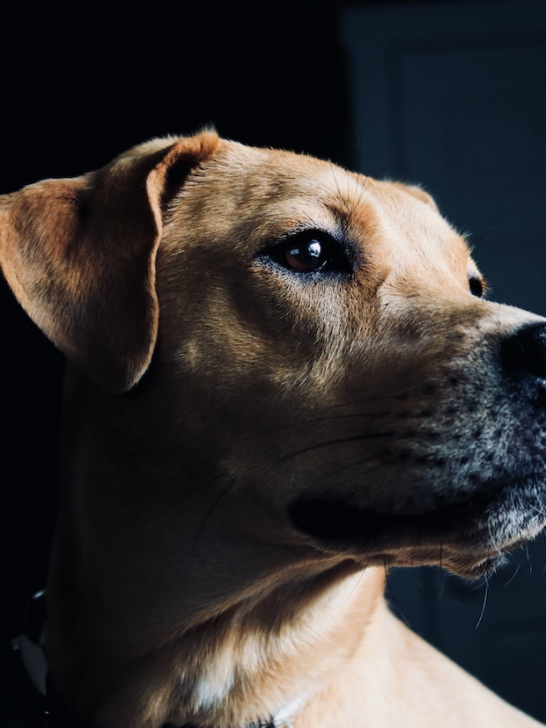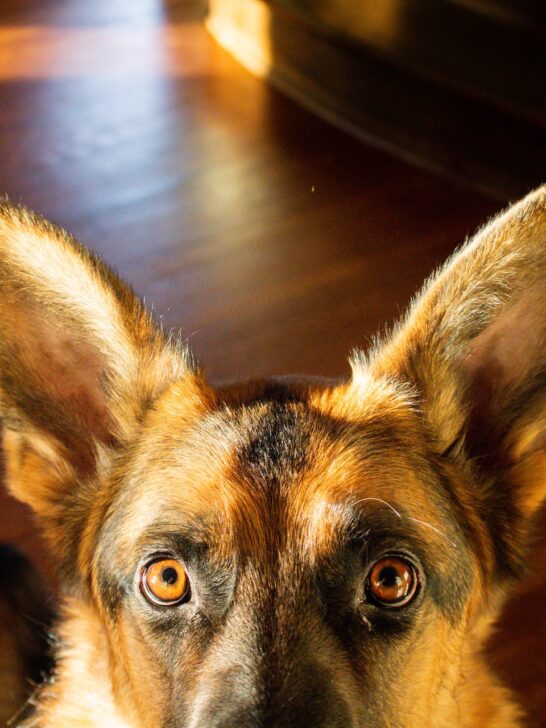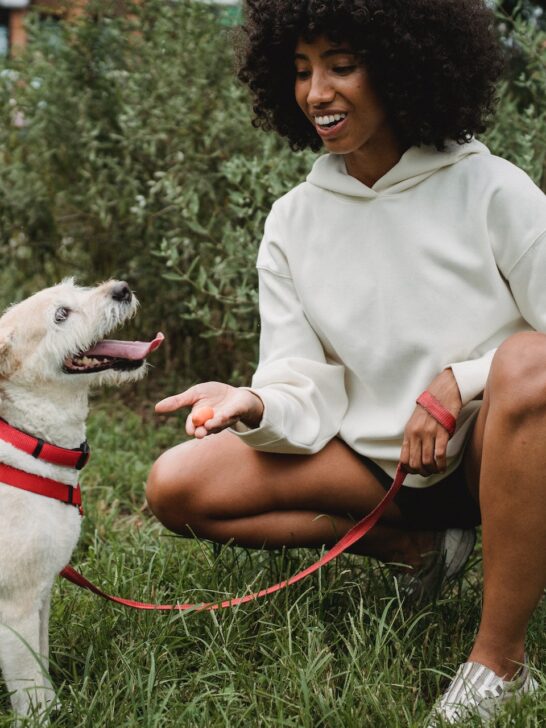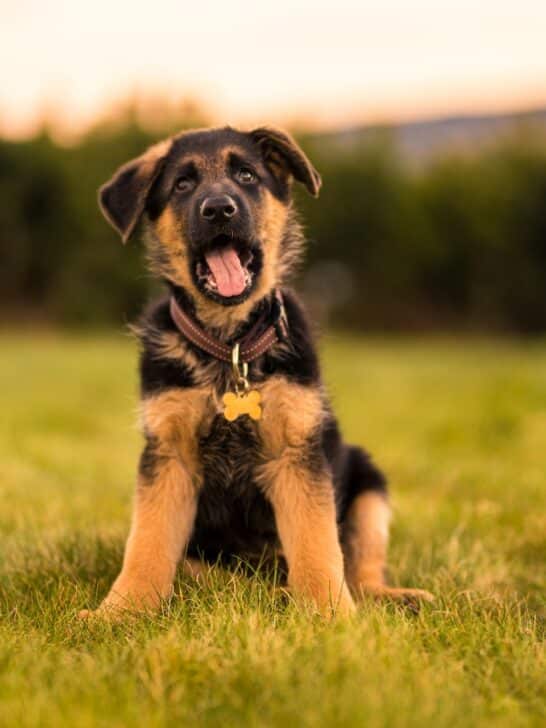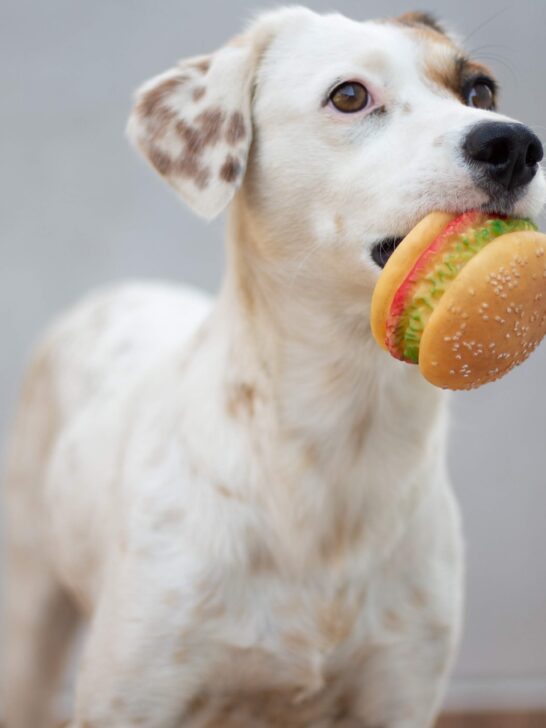How to Properly Care for, Grow, and Groom Your German Shepherd’s Coat
If you have a pet German Shepherd, chances are you’ll want to ensure that their fur is as beautiful and luxurious as it can be.
A gorgeous coat often directly correlates with optimal health.
So how can you help your dog’s hair grow and thrive? Let’s take a look.
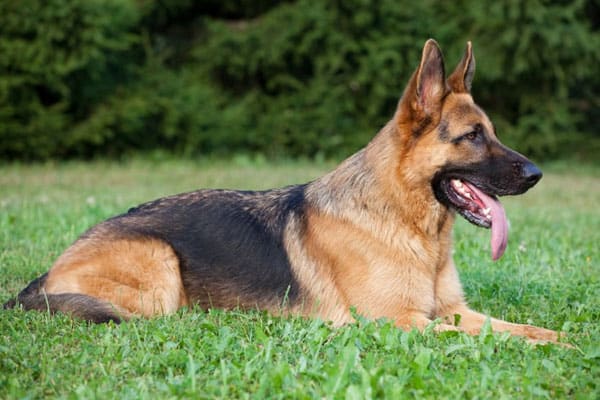
How to Grow German Shepherd Hair?
It’s important to feed your German Shepherd a healthy and well-balanced breed-appropriate diet.
Many topical oils can also improve hair growth in dogs such as vitamin E and evening primrose oil.
Below, we will go over exactly how to care for, maintain, and grow out the coat of your German Shepherd.
Follow these simple steps, and before you know it, your canine companion will have a lovely and lustrous fur coat to show off at the dog park.
What Kind of Coats do German Shepherds Have?
Before you can learn how to properly care for your German Shepherd coat, you’ll need to determine which coat type they have.
German Shepherds come with four different types of coats.
These are:
- Short with an undercoat – Easiest to groom, doesn’t grow out very long
- Medium with an undercoat – Medium grooming requirements, grows at varied rates
- Long with an undercoat – Most difficult to groom, will grow out long, full, and fluffy
- Long with no undercoat – Grows most slowly, sheds the least, grows out the longest
Since chances are three out of four that your German Shepherd has an undercoat, this in-depth article will focus on grooming and growing out undercoats and overcoats simultaneously.
How Much Grooming do German Shepherds Need to Help Their Fur Grow?
If you own a German Shepherd or are thinking of getting one, you’ll want to be prepared for a lot of grooming.
These dogs are sometimes affectionately referred to as “German Shedders” for a reason.
No matter what length of coat your German Shepherd has, they’re going to shed. Shedding leads to matting, and matting leads to stunted coat length.
To prevent mats from forming, you’ll want to brush your German Shepherd daily if possible.
Brushing does more than just remove any excess hair that your pooch sheds. It helps keep their skin healthy in general.
Brushing your dog distributes oils from their glands to the rest of their fur. It also helps their skin. Healthier skin leads to a healthier coat.
You can either brush and bathe your dog yourself or find a quality groomer.
We recommend brushing your dog daily and scheduling regular appointments with a grooming service.
A monthly grooming appointment will go a long way toward managing any undercoat shedding that your German Shepherd exhibits.
When you’re grooming your dog’s coat, you’ll need to have the right tools in your arsenal.
Here’s a great article to tell you about which brushes are best to use on German Shepherds.
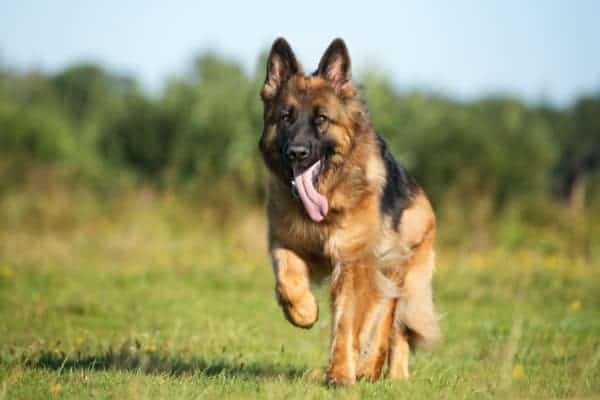
How Often Should Your German Shepherd be Bathed?
If you are trying to give your German Shepherd a clean and healthy coat, bathing them on the right schedule is key.
You don’t want to bathe them too often but you also don’t want to wait too long between baths.
How much you bathe your dog will depend on a few factors.
How much outdoor time does your dog get? How long is their coat?
Will you be showing your dog professionally or are they mainly your family pet?
Bathing your German Shepherd too often can cause skin irritation, drying, and even hair loss.
If your dog spends most of their time outside, it’s best to bathe them about once a month.
So, you can expect to give your pooch a dip in the tub no more than every 3 weeks.
Not bathing your dog often enough can also cause issues. Going more than 12 weeks between baths can cause excess coat oil build-up.
This can block pores in your dog’s skin and prevent hair from being able to grow properly.
If your dog spends most of their time indoors, a bath every 6-8 weeks will usually do the trick.
This will help to ensure that their coat doesn’t become overly dried out from shampoo or too oily from sebum buildup.
Should You Brush Your German Shepherd Before or After a Bath?
While experts argue on whether it’s better to brush before a dip in the tub or afterward, for German Shepherds, you may want to do both.
Brushing before the bath can help ensure that their coat gets evenly washed and brushing after bathing prevents matting and reduces shedding.
Before your dog gets wet, you’ll want to use a long bristled brush to remove as much of their dense undercoat as possible.
This will help any shampoo and conditioning treatments you use penetrate evenly.
To keep your drain from clogging with dog hair, you might want to consider taking your pooch to a groomer or bathing them outside.
If this isn’t possible, you may want to invest something that will prevent dog hair from accumulating in your drain.
After you have bathed your German Shepherd, you’ll want to brush them out again. It’s not the best idea to brush a wet dog.
For one, it’s not very efficient, and for two, it can cause their hair to break and split. This can inhibit fur growth over time.
Wait until your dog is completely dry, and then thoroughly brush them out to distribute the oil from their skin glands through their fur.
This will also help with any potential matting and shedding. If you blow-dry your dog, use the lowest possible heat setting.
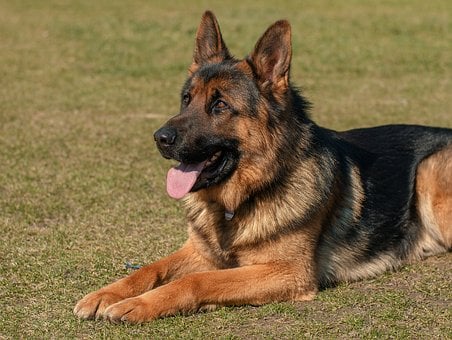
Does Diet Impact the Growth of German Shepherd Fur?
Apart from their overall health, diet is probably the most important factor to consider when it comes to your dog’s coat growth.
Your dog’s diet can greatly impact them physically, mentally, and aesthetically. That’s why quality dog food is so critical.
There are many dog foods available that claim to help with fur growth. In many cases, these claims are accurate.
Quality dog foods will usually contain Omega’s, Fish Oils, DHA, and other key vitamins and minerals that can help your dog stay healthy.
Since German Shepherds can be prone to hip dysplasia and arthritis, a high-quality diet is a good idea no matter what.
Fatty acids, lipids, and other healthy oils can help with your dog’s coat growth, general health, and joint functionality.
Your dog’s food can also help to reduce shedding and hair loss. This will reduce matting, and thus, help your dog’s coat grow faster, longer, and healthier.
Healthy fats play a very important role in preventing hair loss. Key nutrients can prevent dullness as well.
Some of the most important nutrients to look for in your German Shepherd’s food:
- Omega-6
- Omega-3
- Zinc
- Vitamin A
- Vitamin E
- Vitamin C
Remember, what’s inside really does count, especially when it comes to your dog’s coat and physical appeal.
According to Pet WebMD, ensuring that your German Shepherd is being fed a vitamin and nutrient-rich diet can help them look and feel better all the way around.
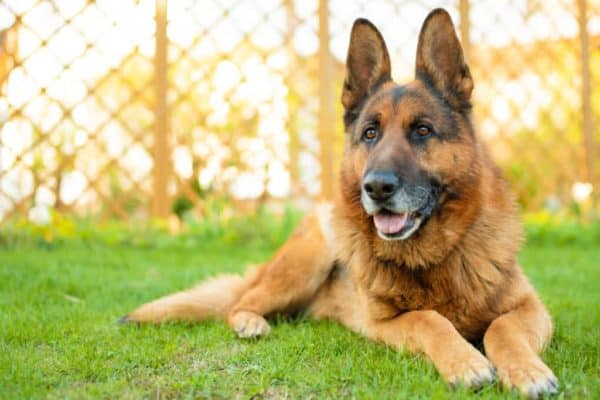
Are There Any Products That Help With German Shepherd Hair Growth?
You may be surprised to find out that there are quite a few products available that can help with your German Shepherd’s hair growth.
While it’s not a good idea to use most human hair products on your dog, there are many dog-friendly options on the market today.
Remember, the best way to help your dog’s hair grow out strong and healthy will be to feed them a healthy diet.
Apart from your dog’s diet, products that you can purchase to help grow out your German Shepherd’s coat include topical oils and grooming tools.
Many topical products exist that can help expedite your dog’s hair growth and improve their fur health.
For example, you can use flaxseed oil, grape-seed, horsetail, and evening primrose oil on your dog’s coat.
This will improve coat shine, moisturize your dog’s skin, and stimulate hair follicle circulation.
Tea tree oil and oatmeal shampoos can also help with hair growth. These are moisturizing options that can reduce breakage and dryness in your dog’s coat.
Leave-in conditioners may also help with this.
There are a few grooming tools that can also be helpful.
For instance, opting for a brush specifically tailored toward dogs with a dense undercoat can save you time and reduce shedding.
Certain combs for long-haired dog breeds may also be useful.
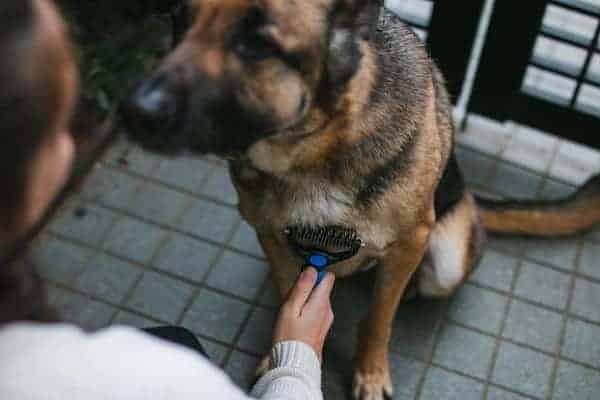
Can any Health Issues Slow Down Hair Growth in German Shepherd?
According to Pet MD, Many health-related issues can negatively impact the growth of your dog’s fur.
Two common culprits of hair loss are hypothyroidism and Cushing’s disease.
Mange, fleas, ringworm, and fungal issues can also cause hair loss in dogs and may also prevent new fur growth.
Wrapping Things Up
So now you know! Your German Shepherd’s coat will grow best if your dog is healthy and groomed regularly.
There are also some helpful products available to improve your German Shepherd’s hair growth rate.
Remember, a happy dog is a healthy dog, and a healthy dog is a beautiful dog.
























